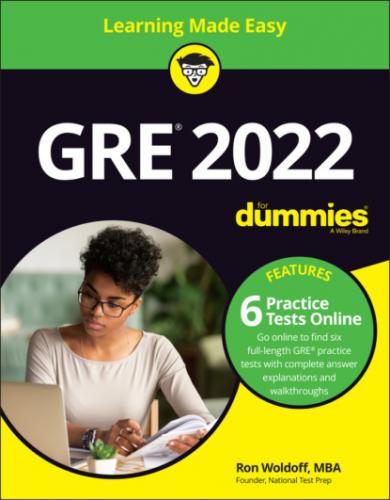GRE 2022 For Dummies with Online Practice. Ron Woldoff
or “Pick two answer choices that create sentences most alike in meaning (in Sentence Equivalence).”
Also, the one-answer questions allow you to select only one answer, and the two-answer questions allow you to select more than one. Go through it once and you’ll be fine: I’ve never had a student mix this up.
Trying it out
The following example of a Text Completion question shows how all answer choices appear to fit perfectly but only two specific words actually make logical sense.
Directions: For each blank, select one entry from the corresponding column of choices. Fill all blanks in the way that best completes the text.
The key word in this example is frustrated, which conveys a strong negative emotion. Choices (B) and (D), hurled and ferocity, are the only choices that support such a negative emotion. Note that this is a single, two-part question. You may select any of the three answer choices for each blank, but you must choose both correct answers to earn credit for the question.
The following example of a Sentence Equivalence question shows how all six answer choices appear to fit within the sentence structure, but only two answers actually support the meaning of the sentence.
Directions: Select the two answer choices that, when used to complete the sentence, fit the meaning of the sentence as a whole and produce two completed sentences that are alike in meaning.
The sentence suggests that Billy did well on the GRE. The best words to convey GRE success are aced and passed, making Choices (A) and (C) the correct answers. Again, you must select both of these correct answers to earn credit for the question.
Developing Your Skills for Finding the Correct Answers
Text Completion and Sentence Equivalence questions are designed to measure two core proficiencies: interpreting the text and using the vocabulary. These are two distinct skills that you build separately but must use together.
This chapter guides you through the basics, and Chapter 7 has the tough vocab. Interpreting the text can be challenging; otherwise, it’s no fun — and has no place on the GRE. The following sections give you an overview along with how you can eliminate incorrect answers.
Interpreting the Text 101
Interpreting the text means discerning its meaning in the absence of the key words. Doing this prior to looking at the answer choices is the best way to quickly eliminate choices that don’t make sense, and the GRE-makers have fun trying to trick you. No worries, though — if you know what to do, you can discern the meaning. First, though, try this simple example:
Directions: Select the two answer choices that, when used to complete the sentence, fit the meaning as a whole and produce two completed sentences that are alike in meaning.
Even without the missing word, you can construe the meaning of the sentence. The phrase so heavy tells you that these boxes are difficult or impossible to lift. After realizing this, you can immediately eliminate easily and effortlessly. The words fully and nearly are a little tougher to ignore, but they really don’t make sense either. The correct answers are Choices (B), hardly, and (E), barely.
Getting the gist of the text
One way to figure out the meaning of a challenging sentence is to see whether it has a positive or negative connotation. This high-level perspective can help you find words that convey the correct meaning. Try it out on this example. Though not really a tough sentence, it shows you what I mean:
Directions: Select the two answer choices that, when used to complete the sentence, fit the meaning of the sentence as a whole and produce two completed sentences that are alike in meaning.
